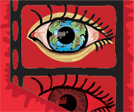Screening and discussion, The Upside Down Book
Location
Bamboo Room (2650) and Reading Room– Center for Campus Life
Start Date
24-4-2014 9:15 AM
End Date
24-4-2014 10:10 AM
Description
Dr. Hinda Mandell, RIT. Screening and discussion, The Upside Down Book.
Imagine a book that is so toxic that rigorous hand-washing is required after coming into contact with it. This book in question is a 1938 copy of Mein Kampf, Adolf Hitler's political manifesto. Karen and Fred Mandell of Boston, parents of filmmaker Hinda Mandell, have displayed this book upside down on their bookshelf for decades. Fred Mandell's uncle – a Jewish-American soldier – brought home the book from Germany at the end of World War II. With a bare-bones inscription on the inside cover, the filmmakers – spearheaded by director Matthew White – investigate the power of family lore as they track down the original owners of the Mein Kampf. "The Upside Down Book" seeks to build bridges between two different families nearly 70 years after the end of World War II.
Screening and discussion, The Upside Down Book
Bamboo Room (2650) and Reading Room– Center for Campus Life
Dr. Hinda Mandell, RIT. Screening and discussion, The Upside Down Book.
Imagine a book that is so toxic that rigorous hand-washing is required after coming into contact with it. This book in question is a 1938 copy of Mein Kampf, Adolf Hitler's political manifesto. Karen and Fred Mandell of Boston, parents of filmmaker Hinda Mandell, have displayed this book upside down on their bookshelf for decades. Fred Mandell's uncle – a Jewish-American soldier – brought home the book from Germany at the end of World War II. With a bare-bones inscription on the inside cover, the filmmakers – spearheaded by director Matthew White – investigate the power of family lore as they track down the original owners of the Mein Kampf. "The Upside Down Book" seeks to build bridges between two different families nearly 70 years after the end of World War II.
